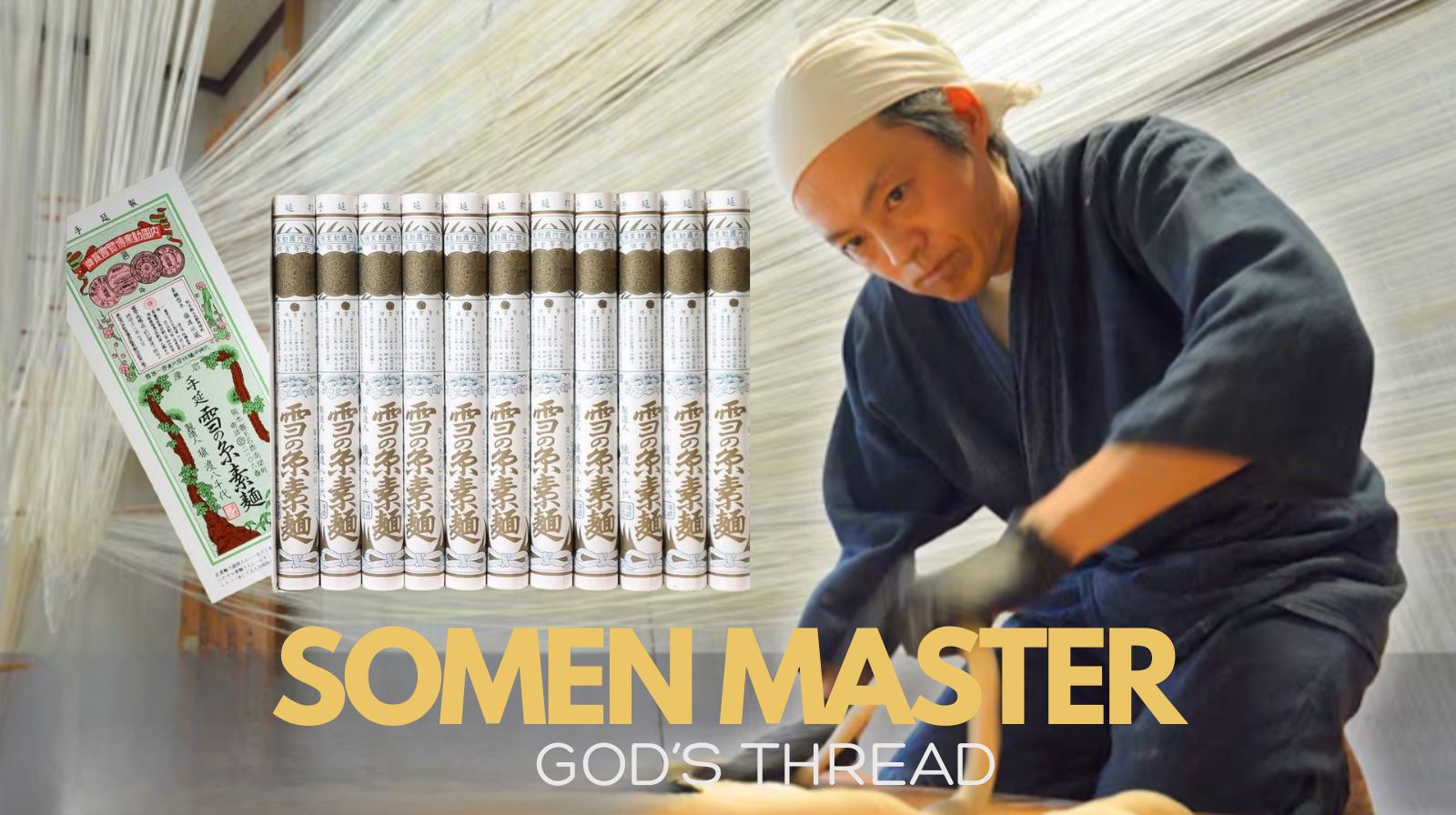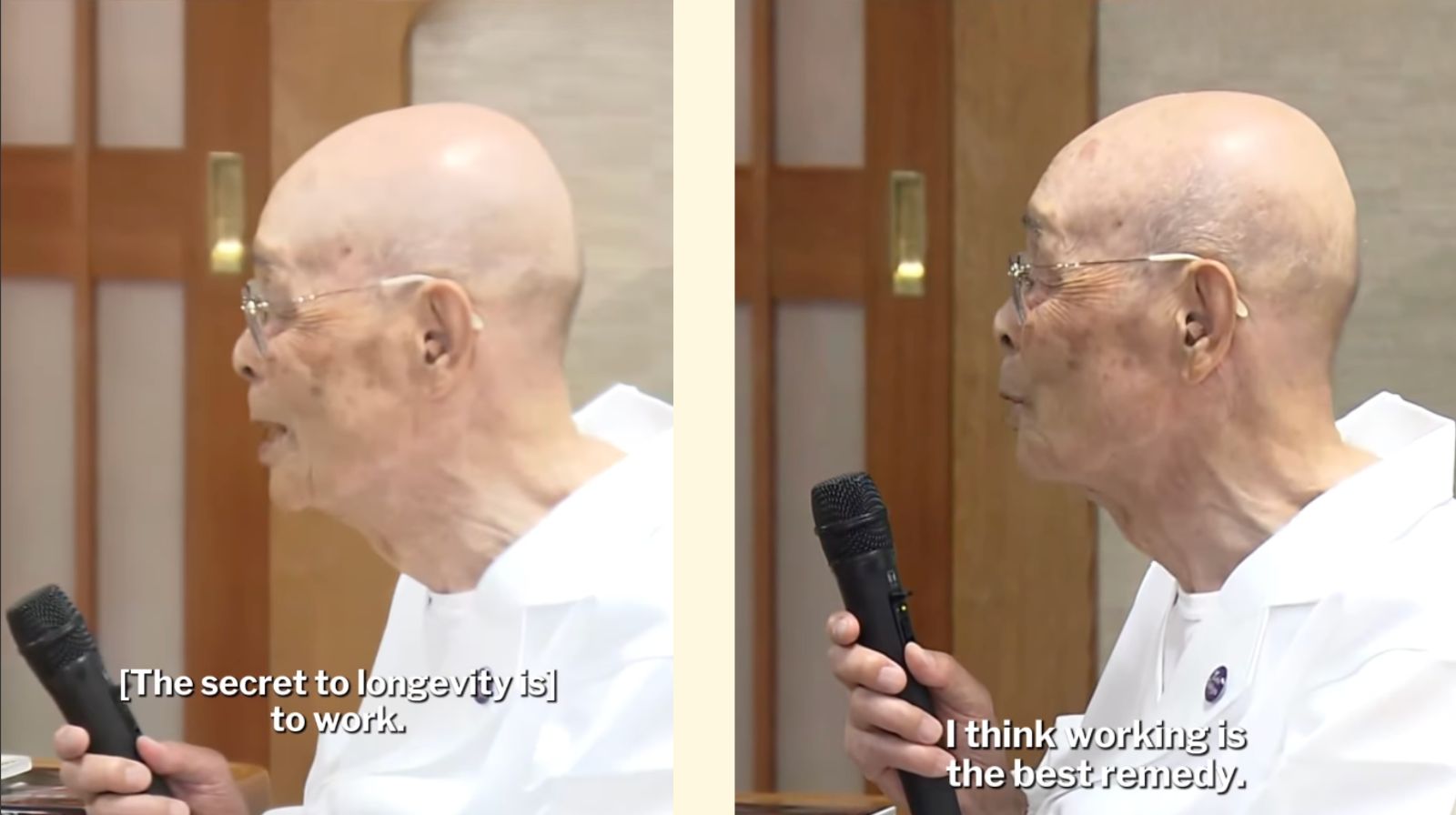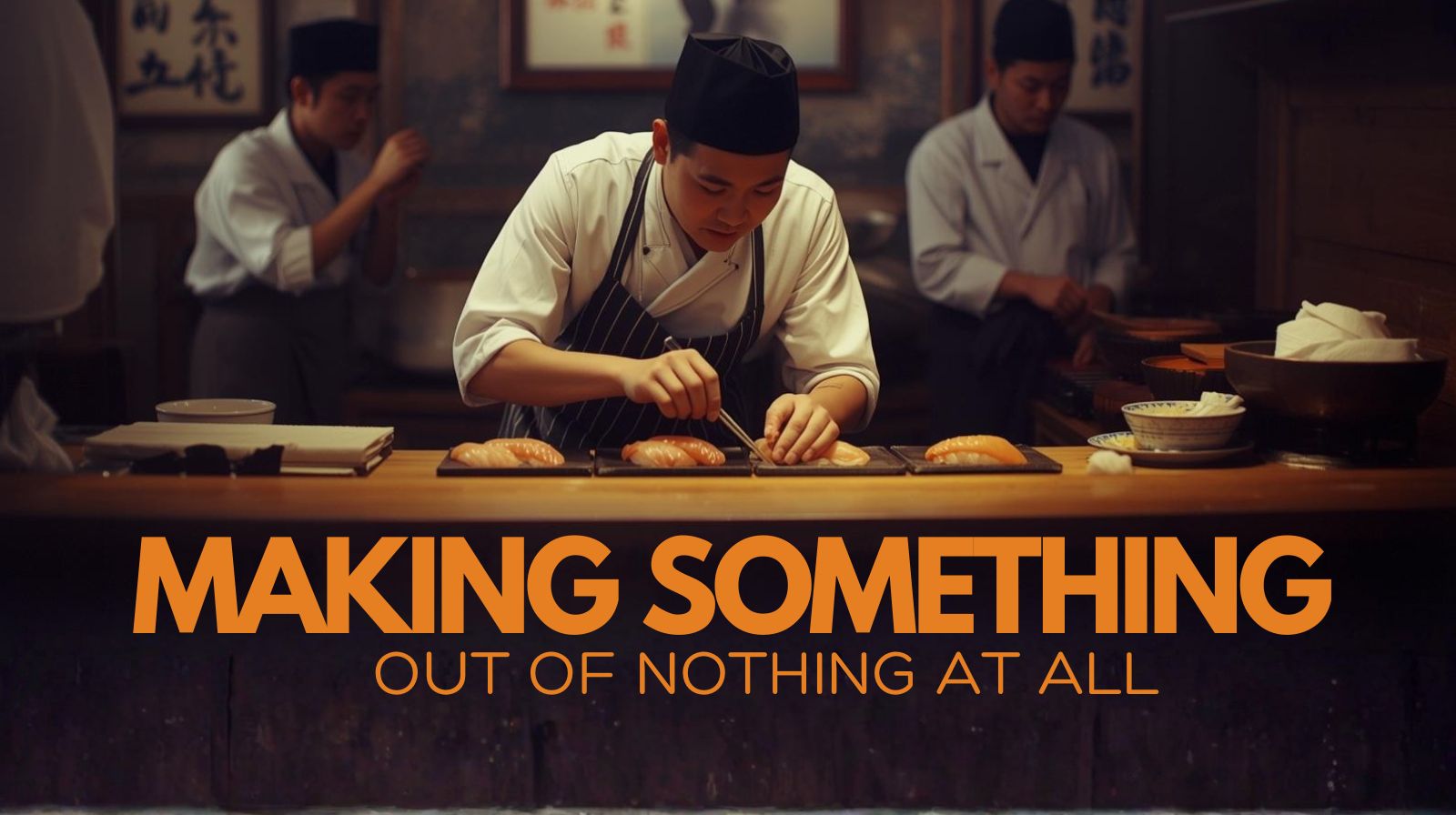
Or the bane of every and anybody who's trying to make something out of... whatever is left.
How do you make something out of nothing at all? In the last newsletter, I was talking about the abundance in desolation, seeing how you can make something out of seemingly nothing. But now let's say you understand the nothing that you're looking at... now what? What do you actually do with that? This is the part that's called skill. Or mastery.
In this rapidly changing world, mastery of something is deeply underrated because what's the point if an AI can do what you do? My theory is that AI is a generalist—the models right now can learn from whatever training data you feed them, but can they be a Japanese master food craftsman? Can they mix wheat flour and stretch it into ribbons of angel hair like this tenth-generation somen noodle maker whose lineage dates back to the Tokugawa shogunate?

Impossibly thin somen noodles, bouncy and delicate
My theory is that while the software knowledge of a craft could be transcribed into an AI knowledge base, the tactile knowledge of something isn't as easily replaceable. The craft of it all—knowing the feel of the dough, when to add more water or flour, how many more stretches the dough can endure before it breaks—that's not as easily replaced.
The Future of the Content Economy
beehiiv started with newsletters. Now, they’re reimagining the entire content economy.
On November 13, beehiiv’s biggest updates ever are dropping at the Winter Release Event.
For the people shaping the next generation of content, community, and media, this is an event you won’t want to miss.
The Octopus Masseur: It's Never Just About the Sushi
The most showcased and renowned of all Japanese food craftsmen is, of course, the sushi chef. When "Jiro Dreams of Sushi" came out, there was such buzz about this tiny hole-in-the-wall in Ginza run by a man who'd been working there since WWII. What's even more amazing is that he's still alive today and, according to this IG reel, just celebrated his 100th birthday. When asked the secret to his longevity, he said, "Work. The secret to longevity is work."

Painfully obvious now, looking back.
Master Jiro though was not a chef trying to do many different things. He wasn't running a Chinese takeout with hundreds of items on the menu or some high-end Japanese fusion restaurant. He chose one thing—traditional sushi—and doubled, tripled, quadrupled down on it. This deep dive into something so particular and singular in focus is why I think so many of us hold Japanese food and culture in such reverence. "Wow, someone worked on that for so long and so deeply to get to that level of mastery."
This became apparent to me watching the movie, particularly the excerpt about how he tests the different tenderness of the tako (octopus) catch of the day—marinating and massaging it for various lengths of time (30 to 50 minutes) and pressures to reach that desired tensile bounce in the final product. That's incredible. What laser focus and dedication to craft.
As much as it is about the sushi, I realize it's also not about the sushi. It's about what you get out of making the sushi. It's also about how you explain your craft to someone after you've achieved that level of mastery.
Sisqo is Wicked (Or: How to Explain a Praise Break)
My latest intellectual guilty pleasure is these Wired "5 Levels" videos where experts explain one concept in five levels of difficulty. To extrapolate this even further, what about explaining things you've always enjoyed but never taken a deeper analytical look at?
I've always enjoyed music, but I know I'll never be good at it—I can appreciate the vibes that come from that world but never be a master of it, because I don't live in it. But that doesn't stop me from watching content about how music I appreciate is made.
With the First Coming and Second Coming of Wicked, Cynthia Erivo singing at the top of her lungs is the jumpstart to the impending holiday season. There's no denying she's a master of the human voice. To shine some light on non-Wicked content, her breakdown of her top ten vocal performances makes her a standout not just in her craft itself but in the explanation of that craft. Especially when it's about a silver-haired man named Sisqo.

"Why do you need to be singing like this when you're singing about a thong?"
What a throwback. I hadn't heard this song since middle school until Cynthia brought it back, praising the 1999 Spring Break anthem. I didn't even know what a key change or a praise break was, but when put into the context of "that thing Sisqo does at the end of the song"—that I understand immediately.
I think that's what a master does: they put it in terms and give you entertaining examples of what they're trying to illuminate so it clicks for you in your brain in a way that might not have otherwise happened. Every time I think about Sisqo now, I'll think—praise break, key change. It's also a reminder of the components of why you love that song in the first place. Because that man is working so hard to make something meaningful about something that seems so trivial.
The Craft You Take With You
So that's what I mean when I say I can appreciate how masters can make something out of nothing at all. Work does give you longevity and purpose, but work becomes a craft when YOU also have to get something out of it. It makes you a better storyteller, a better communicator, a better conduit of the passion you feel burning up inside you.
In that way, a job and a craft are different. A job can be measured by the quality and quantity units of work you produce, but a craft is the way you do something. You can be fired from a job, but a craft you take with you once your notice period has run its course.
I've always wanted to be really, really good at something. I remember in first grade when we did a show-and-tell about what we wanted to be when we grew up, I said I wanted to be an Olympian. I would have said President, but unfortunately, like Arnold, I wasn't born in the US.
Writing this week's newsletter has helped me reflect that perhaps I didn't want to actually be any of those professions. I just wanted to be really, really good at something—world class, cream of the crop. Even if it means making somen noodles day after day or massaging octopus to tenderize the meat proteins.
Making Love Out of Nothing at All
The veneration and respect for the Masters is how they can make something out of nothing at all. They show us what's possible: air can become sound, texture can be tenderized, and thongs can be praised.
Maybe that's the real craft—not just doing something well, but transforming the mundane into the sublime. Whether you're stretching noodles that have been stretched for ten generations, massaging an octopus for hours, or hitting a key change in a song about underwear, mastery is about finding the extraordinary in the ordinary. It's about working on something so long and so deeply that you can finally explain to someone else why it matters.
And maybe, in this age of AI and automation, that's exactly what can't be replaced—the human ability to care deeply about something that seems like nothing at all.
What's the one thing you'd want to be world-class at, even if it seems trivial to everyone else? And more importantly, how would you explain to someone why it matters?
Backyard Izakaya: One Year Anniversary Celebration
It's been a full year of gochujang pasta experiments, Sisqo praise breaks, and finding abundance in desolation. To celebrate this journey from zero to newsletter, I'm sending out a small thank-you package to readers who've made this year of writing worthwhile.
Inside your package: custom Backyard Izakaya coasters (for those drinks we share while reading), stickers, and a few other surprises that embody our little corner of the internet.
This is completely free—my way of saying thanks for reading my thoughts on everything from Mongolian dinosaurs to Japanese food craftsmen techniques. Limited quantities available, US + Hong Kong shipping only for now (international friends, I'm working on something for you too).
Fill out your info below and I'll get your anniversary package out within 2-3 weeks.
Savoring this moment with you,
Kevin L



